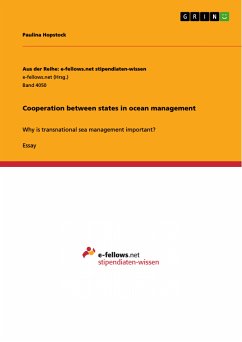Essay from the year 2021 in the subject Law - European and International Law, Intellectual Properties, grade: A, University of Bergen, course: Law of the Sea and its Uses, language: English, abstract: It is easy to draw a border on a map. It is easy for a state to keep to its own side of the border - so long as activities on land are concerned. But when activities at sea enter the equation, it is not as simple anymore. Overall, there are only 44 landlocked countries that have no immediate access to open water, so the question of how to manage the oceans is of high importance to nearly every state in the world. Often, man-made and natural borders do not match. Especially at sea, biophysical borders are more porous than they are on land, so the effects of human activities are not limited to the particular area in which they take place . Spill-over effects from marine activities are common, specifically among neighboring countries. This may result in conflicts between different stakeholders that need to be solved at an international level. Because of this, when managing sea spaces, transnational coordination plays a key role.
Dieser Download kann aus rechtlichen Gründen nur mit Rechnungsadresse in A, B, BG, CY, CZ, D, DK, EW, E, FIN, F, GR, HR, H, IRL, I, LT, L, LR, M, NL, PL, P, R, S, SLO, SK ausgeliefert werden.









